This one goes out to all of my lactose-intolerant friends out there! If you’re not already making your own homemade oat milk, promise me you’ll try this recipe. Because they’re charging waaaaay too much for it at the store, considering how simple it is to make. It literally takes about five minutes and it tastes SO GOOD. Like, I usually feel kind of “meh” about oat milk, but I wanted to guzzle the entire batch because it was so cool, creamy, and refreshing. So promise me you’ll bookmark this page and give it a try this weekend, K?
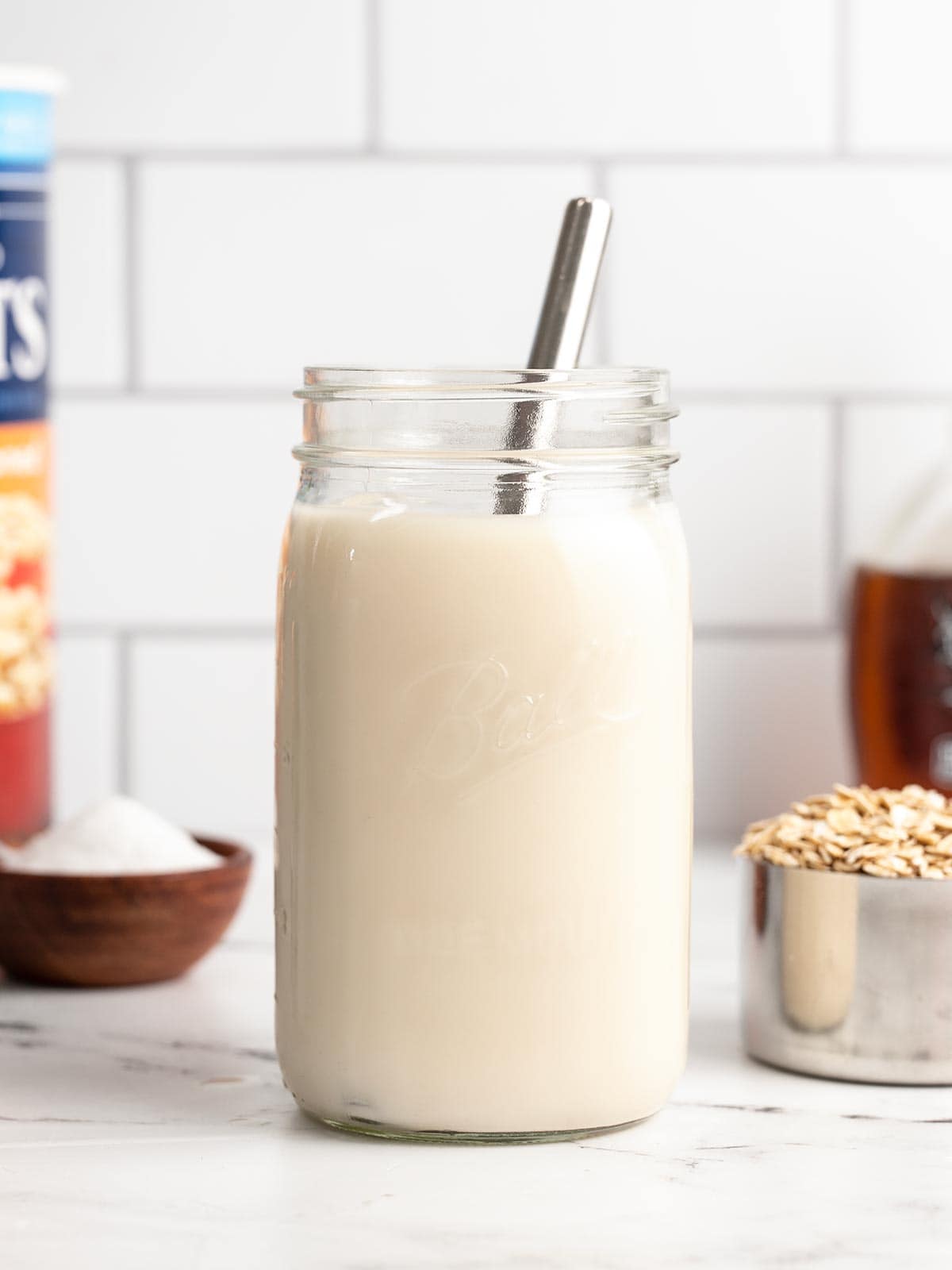
This post contains some affiliate links, which means that we make a small commission off items you purchase at no additional cost to you.
What’s in Oat milk?
When I tell you how simple this oat milk is, you might have a little heart attack when you realize how much you’ve been paying for it at the store. Oat milk is literally just oats, water, salt, vanilla (optional), and a sweetener (optional). That’s it. Five simple ingredients! Here’s a little more detail about what I used to make my homemade oat milk:
- Oats – I tested both old-fashioned rolled oats and quick oats for this recipe and old-fashioned oats were the clear winner. Old-fashioned rolled oats break down just enough when blended to yield a creamy milk that is not too thick or slimy. Quick oats are so powdery to begin with that they completely disintegrated in the water and make a thick, sludge-like oat milk. #nothanks
- Water – Make sure to use cold water to make your homemade oat milk so the starches in the oats don’t get too hydrated. That will lead to thick and slimy oat milk.
- Salt – Just a pinch will do! Salt helps our tongues differentiate between flavors so you can taste the full dimensions of vanilla, sweet, and creamy.
- Vanilla – I think adding a little vanilla really rounds out the flavor of the oat milk so it’s more interesting and enjoyable. You can skip it, but I really feel like the vanilla takes the oat milk from good to GREAT.
- Sweetener – A little bit of sweetness goes a long way with oat milk. I used brown sugar because it offered a good balance between being budget-friendly and adding a slight caramel flavor from the molasses, but maple syrup is even more delicious (just more expensive). Other options are white sugar, honey, agave, stevia, monk fruit, or any other sweetener that dissolves easily in water.
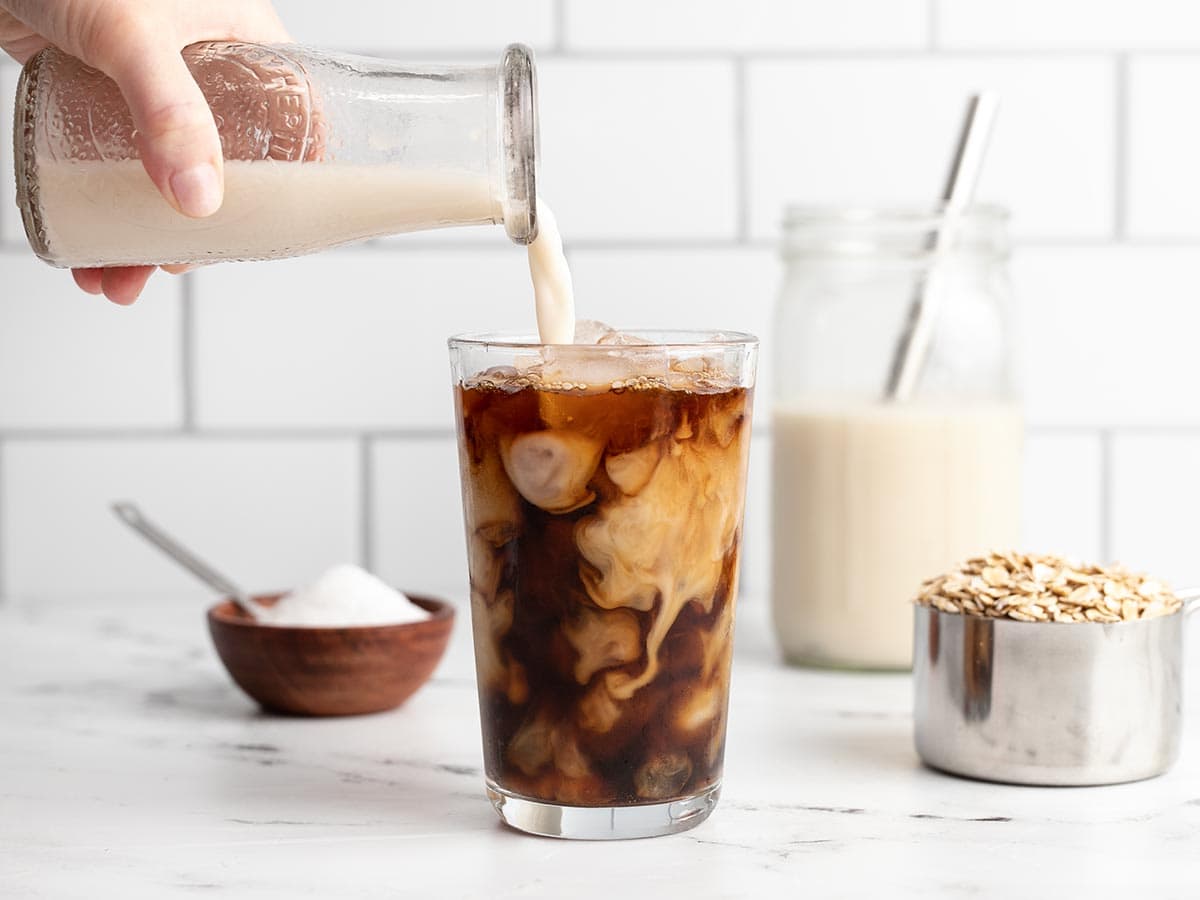
What kind of Strainer to Use
Straining is one of the most important steps in the oat milk-making process because it can change the texture of the oat milk quite a bit. I tested a few different methods for straining so I could give you some options. Here’s what I found:
- Nut Bags or Cheesecloth: These are great options if you plan to make a lot of oat milk because they’re inexpensive and most can be laundered and re-used (check the package for the cheesecloth because depending on the quality, some are not reusable). The key to using nut bags and cheesecloth is to NOT squeeze the liquid through the cloth. Squeezing allows too many starches through, making the oat milk thick and slimy.
- Metal Strainers or Sieves: Metal strainers have quite a large weave and they allow a lot of the oat particulate through, which can result in a thick and powdery-flavored milk. Stacking two strainers on top of each other does help a lot, if this is your only option.
- Lint-Free Dishcloth: The weave on a dishcloth is pretty tight, which makes it hard for the oat milk to flow through. I found this method to be pretty messy and I had to squeeze the oats to get the milk to pass through, which can lead to a slimy oat milk.
- Metal Coffee Filter: Metal coffee filters were my favorite strainer for oat milk! It created just the right texture for the milk and was easy to clean and reuse. So if you happen to have one of these on hand, or want to make an investment for oat milk-making, this is the best option!
Can you Froth Homemade Oat milk?
I tried frothing this homemade oat milk with a handheld frother, and, unfortunately, it does not create a nice foam. Oats do not contain a lot of fat or protein, which is needed to create a stable foam, so store-bought oat milk usually has to have thickeners or stabilizers added to help it foam.
How to Enjoy Oat Milk
I’m not kidding when I say this oat milk was so good that I wanted to chug it straight from the jar. But keep in mind that homemade oat milk does not contain emulsifiers or stabilizers like store-bought oat milk, so you will need to shake it very well before you pour, every time.
Oat milk is great added to coffee or poured over a bowl of cereal (or maybe even oatmeal – how meta). I haven’t tested baking with this oat milk or using it as a substitute for dairy milk in recipes, so proceed with caution. Remember that oat milk does not contain as much fat or protein as dairy milk, which may cause it to react differently in recipes.
Tips for Making Homemade Oat Milk
- Use rolled oats, not quick oats, for a creamy yet light and refreshing oat milk
- Use cold water to prevent a slimy texture
- Strain the oat milk well to keep the texture light, but DO NOT squeeze it through your strainer
- For maximum deliciousness, let the oat milk chill completely in the refrigerator before serving
- Shake the oat milk very well each time before enjoying
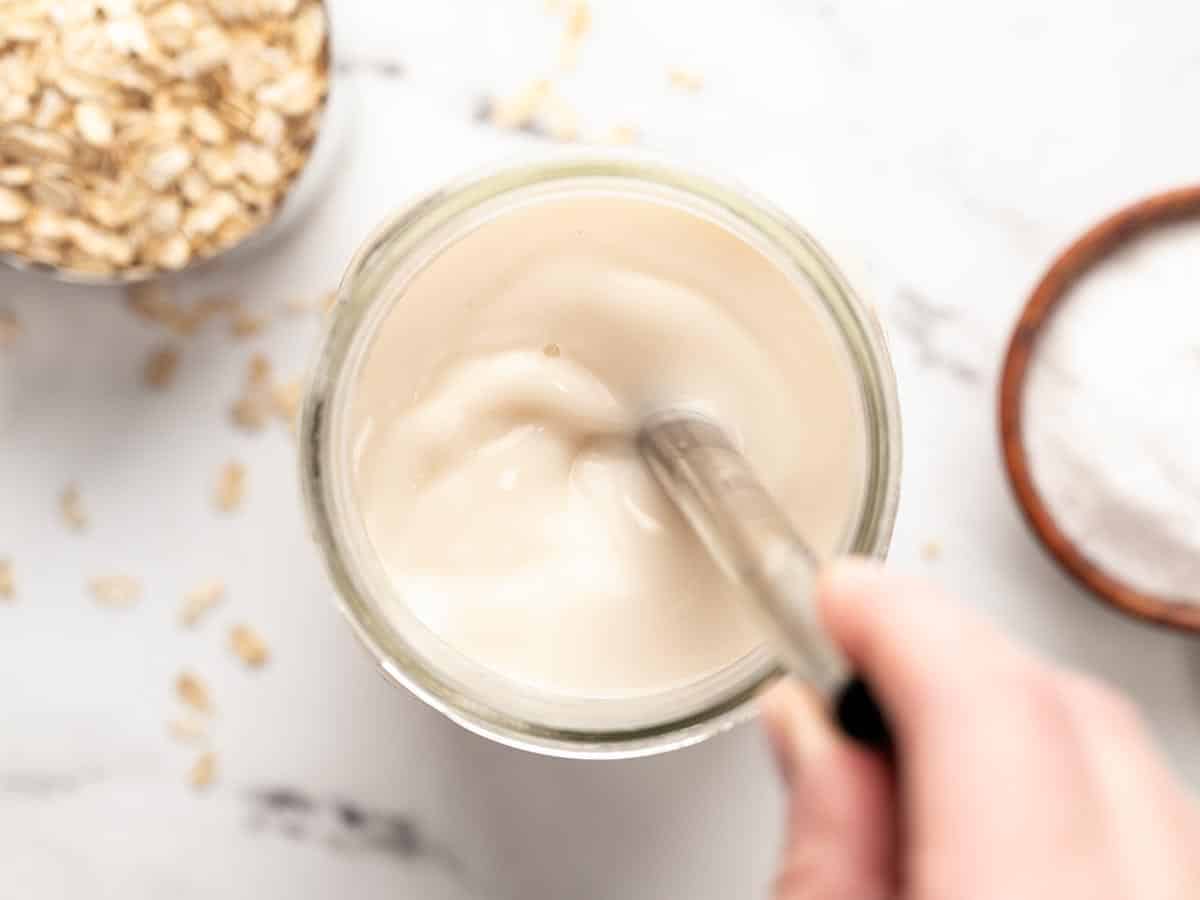
Homemade Oat Milk
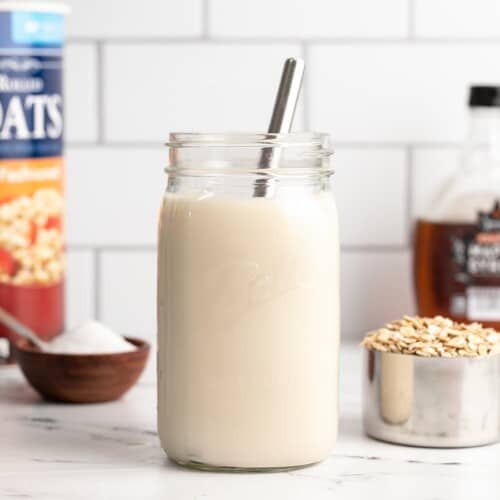
Ingredients
- 4 cups cold water ($0.00)
- 1/2 tsp vanilla extract ($0.36)
- 2 Tbsp brown sugar ($0.08)
- 1 cup old-fashioned rolled oats (NOT quick oats) ($0.29)
- 1/4 tsp salt ($0.02)
Instructions
- Stir the vanilla and brown sugar into the cold water until dissolved.
- Add the oats, salt, and water mixture to a blender. Blend on high for 30 seconds.
- Pour the blended oat mixture through a strainer like a nut bag, cheese cloth, metal coffee filter, or a double layer of metal sieves to filter out the oat pieces.
- Chill the oat milk completely (preferably overnight), then shake very well before serving. Keep the oat milk refrigerated for up to four days.
See how we calculate recipe costs here.
Notes
How to Make Oat Milk – Step by Step Photos
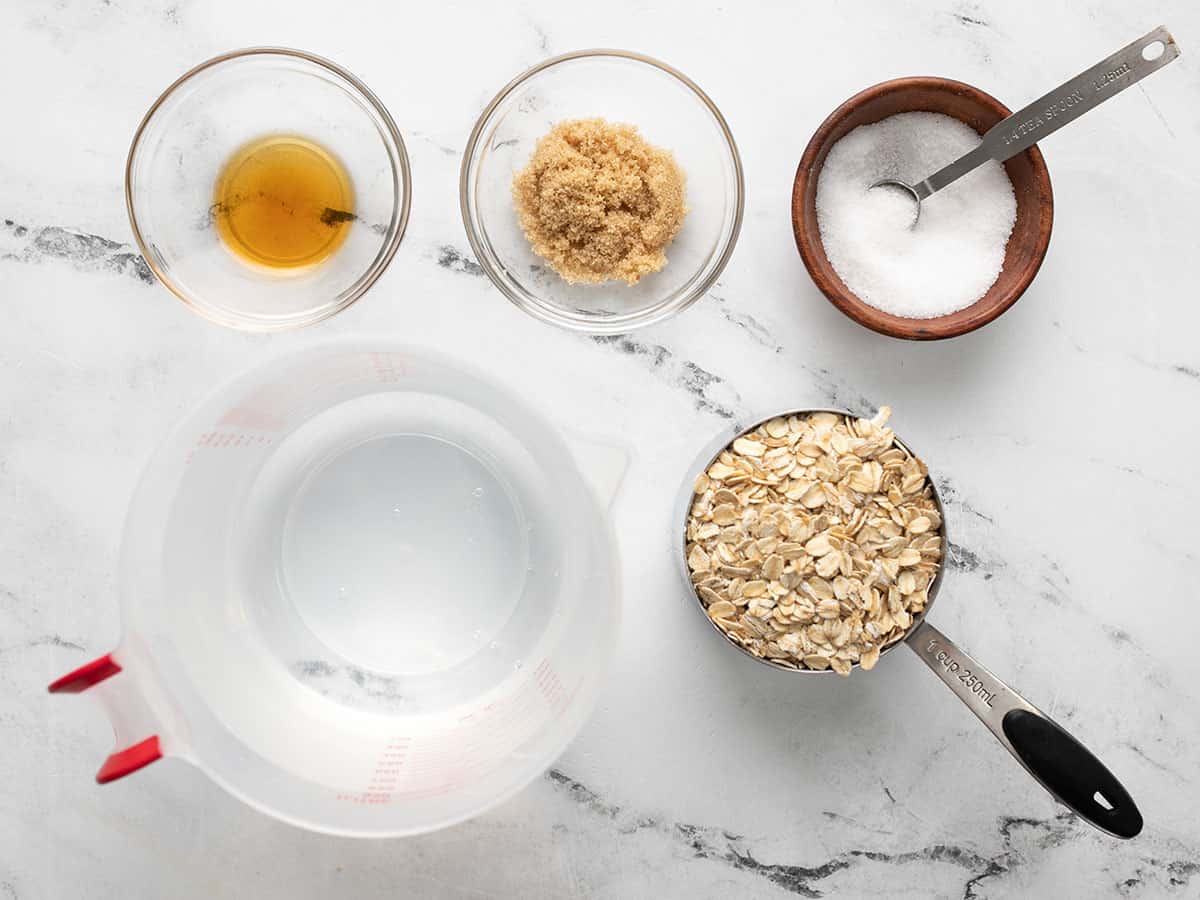
All you need to make your own oat milk is 4 cups cold water, 1 cup rolled oats (NOT quick oats), 1/4 tsp salt, 1/2 tsp vanilla extract, and sweetener (I used 2 Tbsp brown sugar).
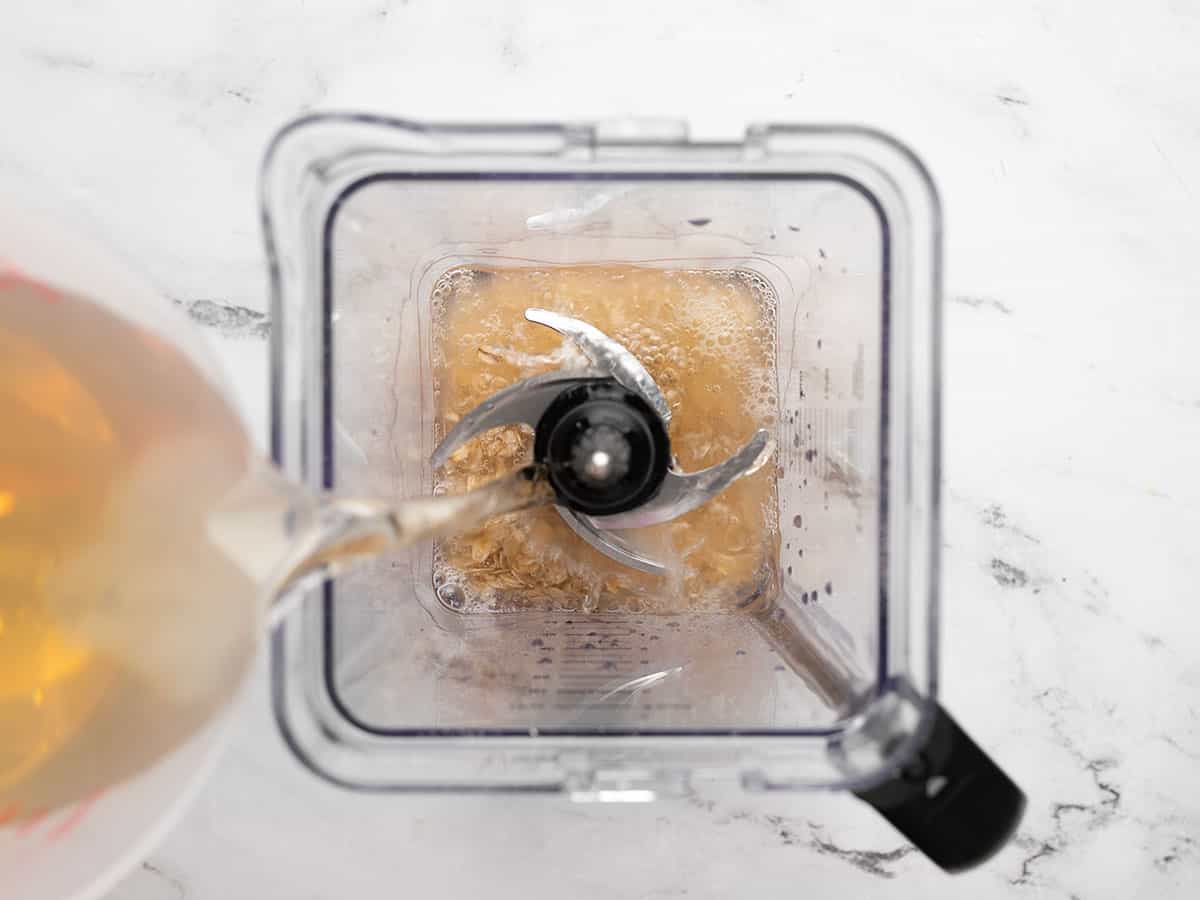
Add 2 Tbsp brown sugar and ½ tsp vanilla to 4 cups cold water and stir until the sugar is dissolved. Add the rolled oats, salt, and water mixture to a blender. I used our big blender for a four-cup batch, but I also tested a half-cup batch in our mini blender and it worked fine.
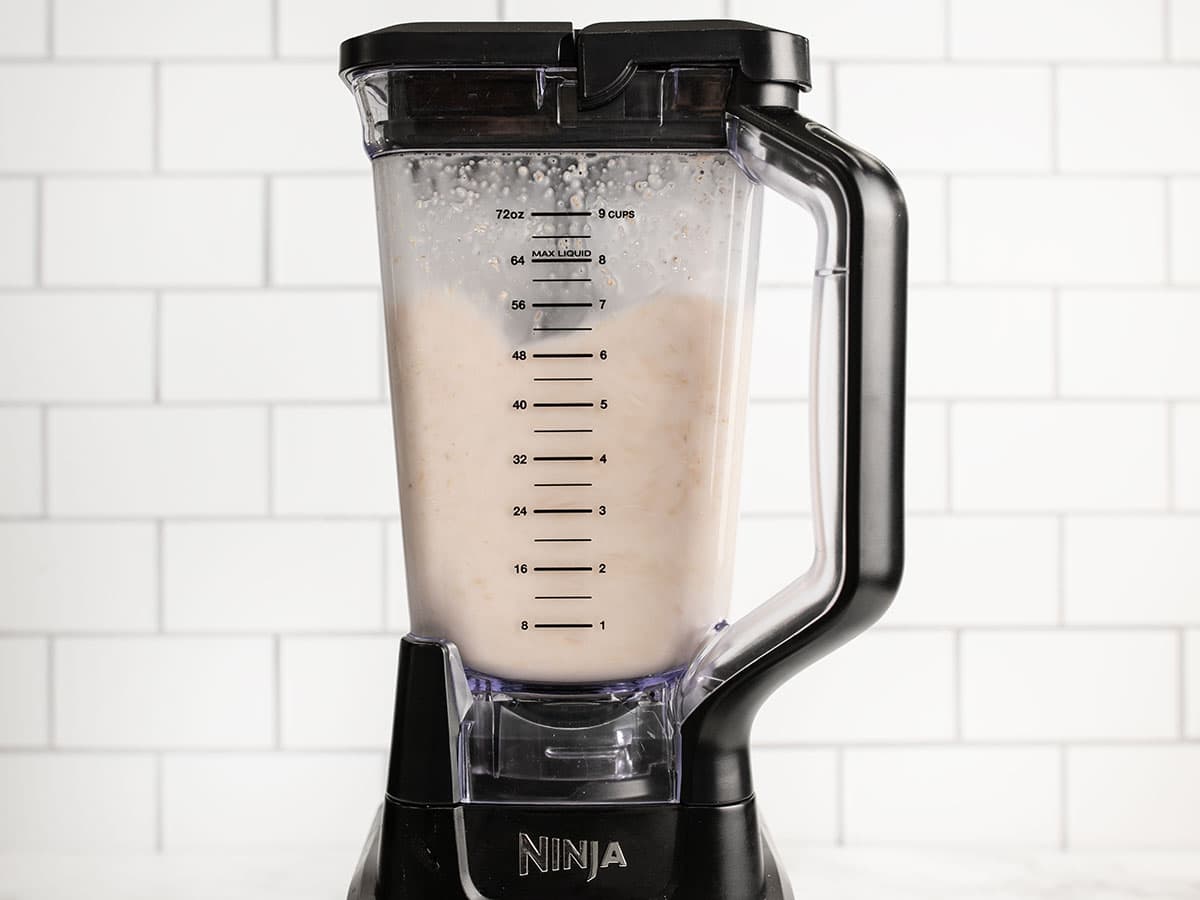
Blend the oats and water for 30 seconds, no more! It’s a good idea to time this on your watch or phone so you don’t accidentally count too fast or too slow. Over-blending the mixture can make the oat milk too thick or slimy.
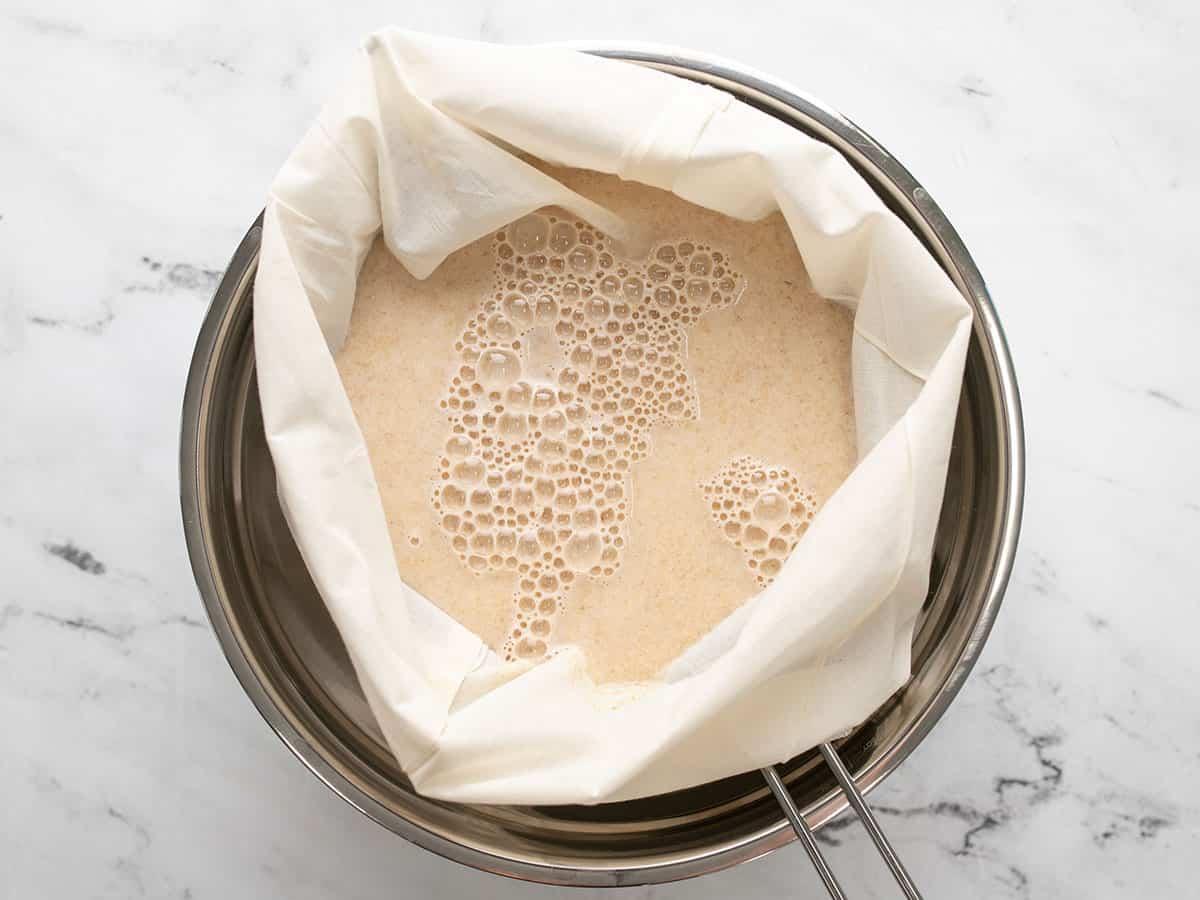
Immediately pour the mixture through a strainer into a bowl. I’m showing the oat milk poured into a nut bag supported by a metal strainer over the bowl, but you can also use cheesecloth or metal coffee filters (see blog text above the recipe for details on each method).
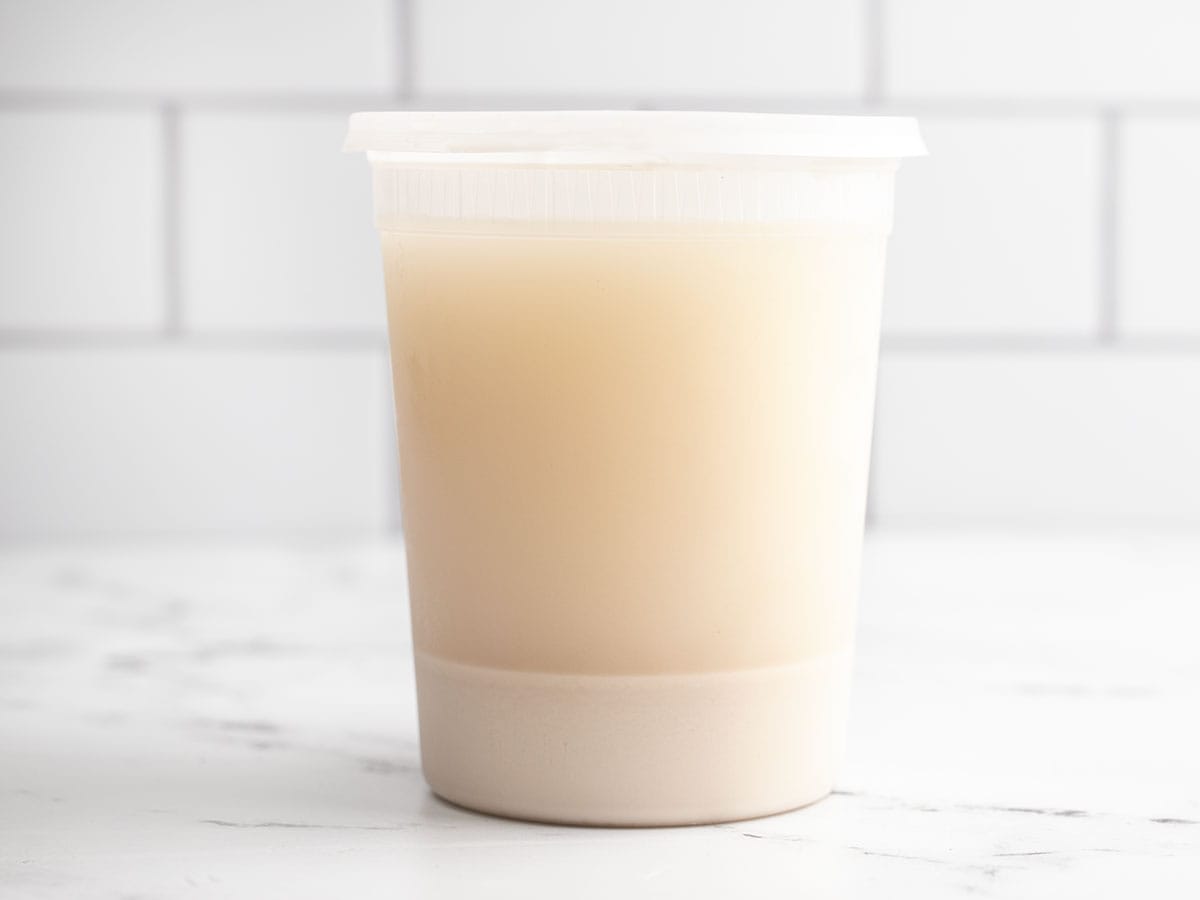
Make sure to chill the oat milk completely (like, overnight) for the best flavor. Because this is homemade and doesn’t have added emulsifiers or stabilizers, it will separate like in the photo above. Just give it a good shake shake shake before enjoying it each time and it will be as right as rain!
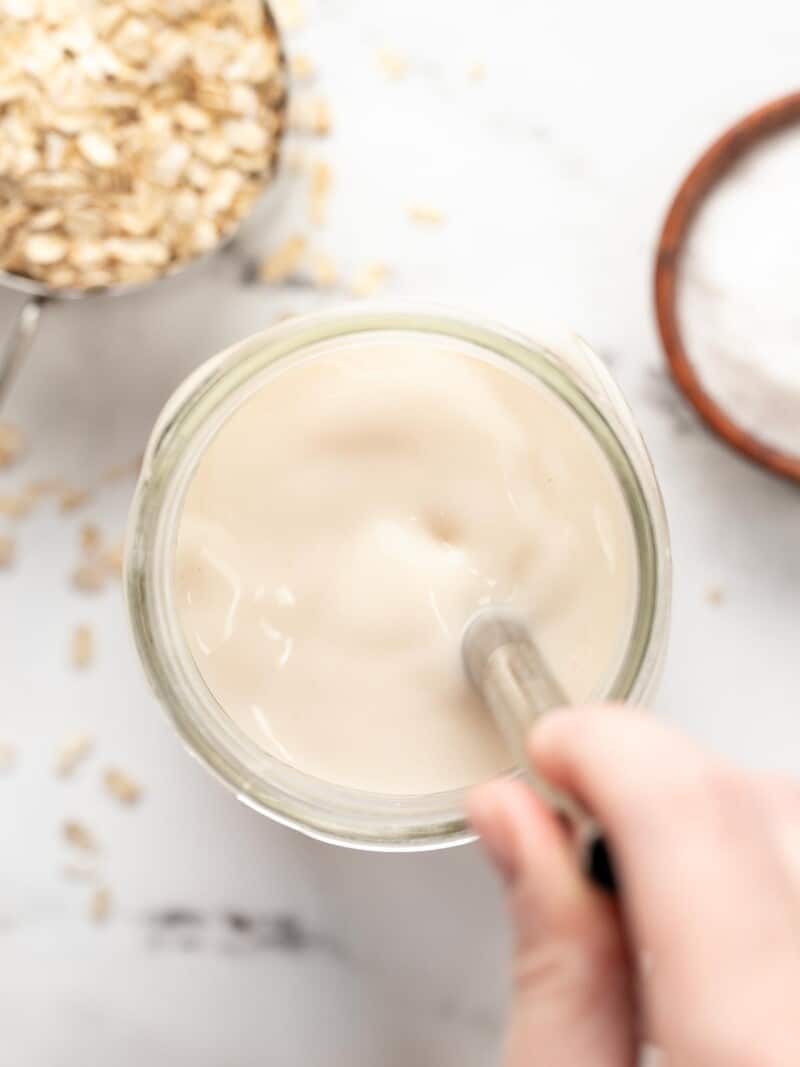
The oat milk will keep in the refrigerator for about four days, so make a half batch if needed to make sure none goes to waste!


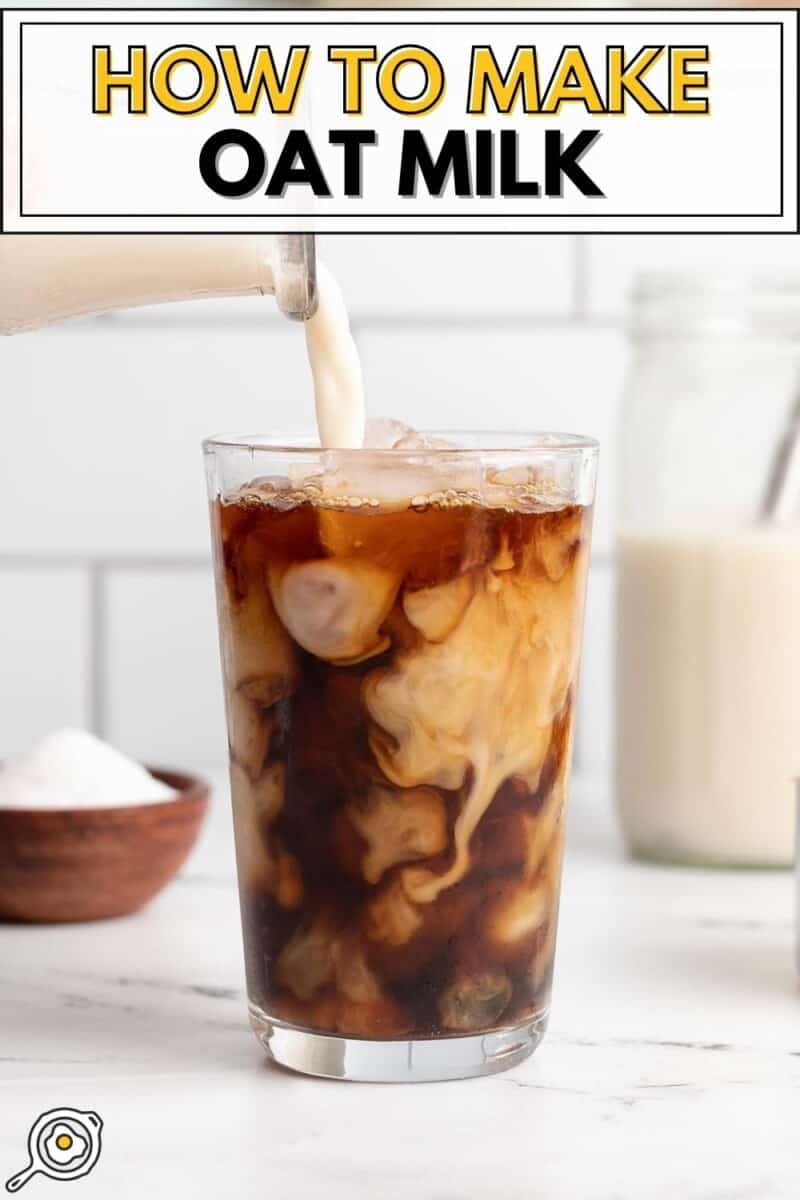
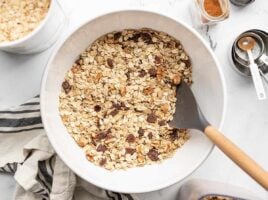
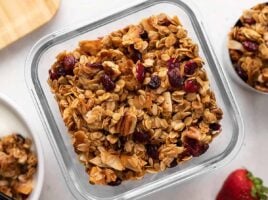

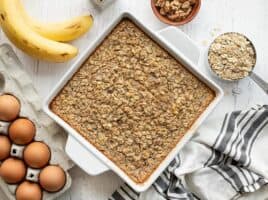
Do you think this would freeze well?
We haven’t tried it, but my gut tells me it wouldn’t freeze the best!
Helpful , easy , useful recipe !
Thank you !
Thanks for the guidance in making the oat milk. This recipe deserves 5 stars.
Love the recipe! I use the milk in my lattes.
Thanks for the recipe. I’ve used a metal strainer and a metal coffee strainer and agree the coffee strainer makes it smoothest. I use dates to sweeten: 2 for lightly sweet, 4 for sweetness I would compare to store bought.
Hi Beth. Thank you. Will try the oat milk recipe. You are the best! Also can I just eat the discarded oats from the seive/cheesecloth? Will try that too.
A lot of people repurpose them in baked goods so you’re fine to use them how you like!
Delicious!! I used maple syrup instead of brown sugar (I only used two little pours). This taste so much better than store bought oat milk! Easy recipe too.
I can’t wait to try this. I am really into preparing food ahead- even my AM cold brew coffee- and then freezing the preps and rotating out of the freezer as needed. Do you think the oat milk would feeeze well?
So easy and affordable!
I would like to share this recipe on MyFitnessPal.com. (a calorie counting site). I will credit you and share your site. Is that OK?
Thanks
Stirring rapidly while in the filter is how this recipe works (you may want to put that in the directions, Beth). It was quick, cheap and delicious! Thanks!
I feel stupid asking this, but if I’m only going to use it for smoothies do I care if it’s strained?
I guess not! A lot of people put oats in their smoothies. :)
I wouldn’t care. I’m actually keeping the discarded oats for my smoothie! No need to waste them. :)
Thank You
Recipe is great, but it seems to take me a really long time to strain the oat milk. Using a metal coffee filter took me over an hour for one batch at the suggested quantity. Is that others’ experience? Or am I doing something wrong?
Oh, wow! It definitely didn’t take me that long. It only took about five minutes. Try using a spoon to stir it a little (kind of scraping the sides) as it drains through so the mesh doesn’t get clogged.
I had the same problem, only I surrendered after about 10 minutes.
I was so delighted that my first batch was a huge success! Can’t believe I’ve been drinking store bought oat milk with all those additives. This recipe is SO much healthier and SO yummy.
Is there anything that can be done to use up the pulp left behind? :)
I’ve used it to bake cookies/bars, it adds a nice chewyness.
I plan to add mine to smoothies!
I just added some of it to my regular bowl of oatmeal in the morning.
Adding a little fat to the oat milk before blending gives it the barista style texture. Just don’t use something with a strong flavor, like olive oil. (Unless that’s what you are going for. Maybe a savory recipe that would work).
Really interesting site.
I make my oat milk just like this, and I’ve used it succesfully in baking as well as some cooking recipes (esp. pancakes).
Why not add some soya or sunflower lecithin as emulsifier? Maybe it will stay in suspension better and even froth better!
Probably because it’s not easily found in stores.